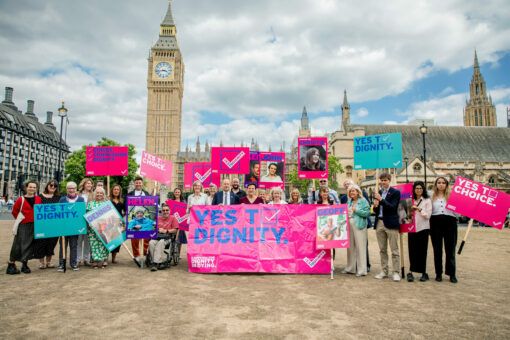Cross-party MPs demand inquiry on assisted dying, with supporters of reform outnumbering opponents by two to one in Commons debate today

- Debate secured after parliamentary petition lodged by Dignity in Dying CEO attracts more than 155,000 signatures
- Comes as Assisted Dying Bills progress in Scotland, Jersey and Isle of Man, with votes in all three Parliaments expected next year
MPs from all parties have today (Monday 4 July 2022) called for a parliamentary inquiry on assisted dying, with speakers in favour of reform outnumbering opponents by two to one in a Westminster Hall debate this evening. The debate was secured after an official government petition lodged by Dignity in Dying CEO Sarah Wootton attracted more than 155,000 signatures from members of the public, and comes as polling reveals that three-quarters (74%) of Brits support an inquiry on assisted dying, with support high across all political views (YouGov, 4 July, commissioned by Dignity in Dying).
Several MPs reported today that they were “on a journey” on the topic, including former Health Secretary Matt Hancock and Steve Brine. Many paid tribute to constituents who had shared their stories of suffering under the current law, including Sarah Green, whose constituents Ann Whaley and Lesley Close watched from the gallery – both of whom had accompanied terminally ill loved ones to Dignitas. Paul Blomfield shared the story of his father, who, terminally ill with lung cancer, took his own life in lieu of the choice of a safe, legal assisted death.
Hancock was among several MPs to highlight the need for an evidence-based debate, referring to data he had commissioned from the Office for National Statistics while Health Secretary and published this April, which indicated that people with severe health conditions may be twice as likely to take their own life than those without.
The Minister responding, James Cartlidge, Parliamentary Under-Secretary of State for Justice, welcomed an inquiry on assisted dying and said the Government would do its best to assist one. He also indicated that the Government would engage with a Private Member’s Bill on assisted dying if it was Parliament’s clear will that the law should change, and intimated that the Government could grant time to a future Bill to ensure it could be fully scrutisined and debated.
This comes after a Private Member’s Bill on Assisted Dying tabled by Baroness Meacher, Chair of Dignity in Dying, passed unopposed Second Reading in the House of Lords in October but fell at the prorogation of Parliament in April, despite considerable public and parliamentary support.
Assisted Dying Bills are currently progressing in the Scottish, Jersey and Isle of Man parliaments, with votes expected in all three next year.
Dignity in Dying campaigns for a change in the law to allow assisted dying as a choice for terminally ill, mentally competent adults alongside high quality end-of-life care and subject to strict safeguards – a change supported by 84% of the public.
Sarah Wootton, Chief Executive of Dignity in Dying, said:
“Today’s debate on assisted dying demonstrated that MPs are at last ready to break the deadlock between Parliament’s inaction and the huge public support for law change, with speakers in favour of reform outnumbering opponents by two to one.
“The clamour for a parliamentary inquiry on assisted dying is louder than ever; MPs of all parties are recognising that it is time to examine how the current law fails terminally ill people and their families, and consider what can be done to reform it. The Government’s position also appears to be shifting, with indications that it would support an inquiry on the topic and possibly grant a future bill the time it needs to be properly developed and debated.
“MPs have clearly been influenced not only by the growing evidence of the harm and injustice caused by the current law, but by their own constituents’ stories of unimaginable suffering. Several families joined me in the gallery this evening and were touched to hear their experiences being raised by their elected representatives, heartened that they are finally being listened to.
“What came through loud and clear, is that MPs cannot ignore the matter of assisted dying any longer – nor do they want to. As echoed by many today, we need an inquiry to understand the failings of the current law, government time to develop and debate proposals for reform, and a free vote on putting right the wrongs of the status quo. Today’s debate should serve as a catalyst for these much needed steps on the path to a safer, more compassionate law.”
Last week the British Medical Association reaffirmed its neutral stance on assisted dying, after an attempt to reverse its policy back to opposition was defeated at its annual meeting on Wednesday. The BMA dropped its longstanding opposition to law change in favour of neutrality last year after the biggest ever survey of medical opinion on the issue found that most doctors disagreed that the BMA should stay opposed (61%) and that half of doctors said they personally support a change in the law (50%). The BMA has followed a growing number of UK healthcare bodies to adopt a neutral stance on assisted dying, including the Royal College of Physicians, the Royal College of Nursing, the Royal Society of Medicine, the Royal College of Psychiatrists and the Royal Pharmaceutical Society.
Over 200 million people around the world have access to some form of assisted dying law. Every Australian state has now legalised assisted dying, after New South Wales’ parliament became the last to vote for assisted dying in May, with only the territories remaining. Similar laws are in place across New Zealand and in 11 jurisdictions in the US, with broader laws in place in countries across Europe, North and South America.
*ENDS*
For further information, photos or interview requests please contact Ellie Ball, Deputy Director of Communications, at ellie.ball@dignityindying.org.uk or 07725 433 025 or Molly Pike, Media & Campaigns Officer, at molly.pike@dignityindying.org.uk.